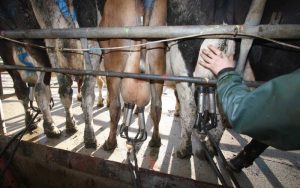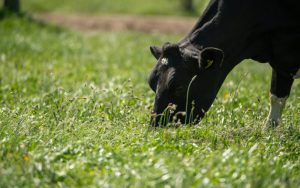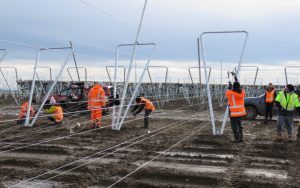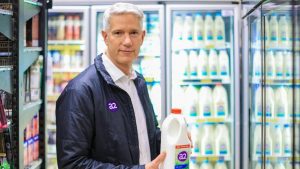
Nearly three decades later, Tane and his wife Clare Bradley run the company previously known as Ocean Organics, now AgriSea, turning native seaweed species Ecklonia radiata into liquid concentrates. They have just been granted a $750,000 loan from the Government’s Regional Strategic Partnership Fund, as Kate Green reports.
Tell me about the uses for seaweed in agriculture.
Our products are primarily used in the primary industries – horticulture, dairy farmers, apple growers, kiwifruit orchards, anything that’s growing.
Seaweeds are packed full of nutrients, growth promotants, amino acids and complex carbohydrates – but not all are equal. Aotearoa has about 1000 species.
Brown kelps are chosen for agriculture. Extracting and fermenting methods ensure the nutrients remain, to be used by soil, plants and animals.
Our beekeeping product was a happy accident. We noticed beekeepers were buying one of our products meant for dairy cows to feed their bees during sugar syrup feeding.
Research revealed Ecklonia radiata contains bioactives that treat bee parasites and gut issues.

How did AgriSea get started?
Tane’s mum and her partner started this business in 1996, under Ocean Organics. They were school teachers in South Auckland, and during a summer spent working on organic farms, one of them stood out for its quality – and its main input was seaweed.
They came back and researched heavily, mesmerised by seaweed’s possibilities. They already knew there was demand, so they sold the house, packed up the van and moved down to the Paeroa.
Twenty-six years on, long gone are the days when we could drive around in a day to see our customers.
We supply to industries in the United States, Canada, Italy and Australia, from grape growers to beekeepers. Autumn sales have seen a 200% increase year-on-year, and our recent partnership with Farm Source has increased farmer uptake.
There are nearly 40 staff now. We used to cook lunch every day of the week, with six of us around the table. Now, we just cook on Wednesdays, but we’re still a whānau.

How do you make sure your practices are sustainable?
The environment is our life support system, and it’s struggling to support us. There’s only so long you can work under a take-and-make-waste model.
We make sure to never take all the seaweed that washes up, because there’s a whole other ecosystem relying on what lands on the beach.
Our local collectors gather seaweed by hand under their permits from the Ministry of Primary Industries – it can be a tough and inconsistent supply chain.
But if we want to have a healthy life support system for generations to come, we’ve got to do it in a more circular manner.

Are there benefits in seaweed for people, too?
We’ve always known we wanted to make a product for humans. Everyone thinks that it’s going to be quite fishy, and different ways of processing it can bring out that kind of flavour – trust us, there’s been some bad attempts.
In 2021 we got a high value nutrition grant to research different ways of fermenting seaweeds. We tried a range of different species and narrowed it down to one that, in our opinion, tastes okay.
Brown seaweeds are high in long-chain mannitol sugars, so they have quite a sweet, almost salted caramel flavour. We think we’ve landed on the one that’s got good iodine content but not too strong.
We all drink seaweed ourselves as a family – our three children have always known they’re not allowed juice without their seaweed.
These are rich in sulfated polysaccharides, which are complex carbohydrates unique to brown kelps in particular. The formulation is now with Otago University for consumer testing.

What’s next?
At the moment, we’re primarily using one species of seaweed, but there are thousands left to discover. The opportunities are vast, not only for AgriSea, but for Aotearoa New Zealand and our economy.
Seaweed doesn’t have root systems, it gains nutrients by absorbing them from the water. We’re working on a bio remediation project that’s never been done before, putting water from the Waihou River through a special ponding system containing seaweed.
It soaks up the nitrogen phosphorus, sending the water back out cleaner. The seaweed can then be processed into fertiliser for farms.
Our new animal supplement range won a Fieldays Innovation award, the first product for dairy cows which reduces their oxidative stress levels, the main cause of disease, and nitrogen excretion, which could have huge benefits for our water quality.

We also paired up with a local distillery in Wellington, Southward Gin. Seaweed turned out to be an awesome way of bringing out the drying components in the gin. They’ve just released a dry vodka, and they’re working on a whisky.
Winning the Hi-Tech Māori company of the year was a tribute to our team, whānau and partners – to get the words “seaweed” and “hi-tech” in the same sentence is just the beginning.
























